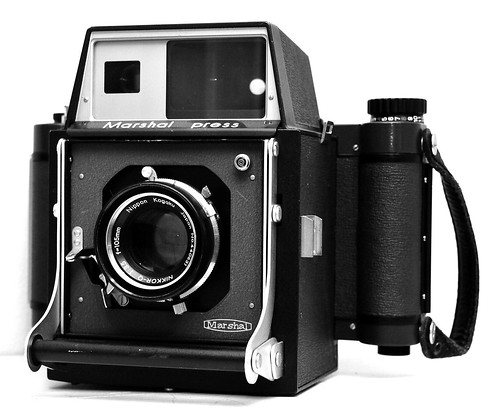Difference between revisions of "Marshal Press"
m (Layout adjustment) |
(shutter, focus wheel) |
||
| Line 9: | Line 9: | ||
}} | }} | ||
| − | Built in the mid 1960s, by Marshal Optical Works, of Japan, the '''Marshal Press''' was a design direct from the brain of [[Mamiya Seiichi|Mr. Seichi Mamiya]]. Resembling a giant [[Mamiya Press]] camera, it also shows influences of the [[Mamiya#6.C3.976_TLR|Mamiya TLRs]]. Coupled rangefinder with rack and pinion focusing, and permanently mounted 6x9 back. The lens was a fixed [[Nikkor]]-Q 105mm F3.5 in [[Hattori|Seikosha]] shutter. Two lens converters were offered, giving a 135mm F4.7, or 150mm F5.6. | + | Built in the mid 1960s, by Marshal Optical Works, of Japan, the '''Marshal Press''' was a design direct from the brain of [[Mamiya Seiichi|Mr. Seichi Mamiya]]. It is a medium format camera that can take either [[120 film|120 / 220 film]]. |
| + | |||
| + | Resembling a giant [[Mamiya Press]] camera, it also shows influences of the [[Mamiya#6.C3.976_TLR|Mamiya TLRs]]. Coupled rangefinder with rack and pinion focusing, and permanently mounted 6x9 back. The lens was a fixed [[Nikkor]]-Q 105mm F3.5 in [[Hattori|Seikosha]] shutter. The shutter is not self-cocking, so it has to be set after each exposure. The lens is focused with a thumb wheel above the film back door of the camera. The focus distance is displayed in a window on the right of the body. Two lens converters were offered, giving a 135mm F4.7, or 150mm F5.6. | ||
== Bibliography == | == Bibliography == | ||
* {{Lewis}} P.122. | * {{Lewis}} P.122. | ||
Revision as of 21:26, 18 July 2014

|
| image by Peter Tjallinks (Image rights) |
Built in the mid 1960s, by Marshal Optical Works, of Japan, the Marshal Press was a design direct from the brain of Mr. Seichi Mamiya. It is a medium format camera that can take either 120 / 220 film.
Resembling a giant Mamiya Press camera, it also shows influences of the Mamiya TLRs. Coupled rangefinder with rack and pinion focusing, and permanently mounted 6x9 back. The lens was a fixed Nikkor-Q 105mm F3.5 in Seikosha shutter. The shutter is not self-cocking, so it has to be set after each exposure. The lens is focused with a thumb wheel above the film back door of the camera. The focus distance is displayed in a window on the right of the body. Two lens converters were offered, giving a 135mm F4.7, or 150mm F5.6.
Bibliography
- Lewis, Gordon, ed. The History of the Japanese Camera. Rochester, N.Y.: George Eastman House, International Museum of Photography & Film, 1991. ISBN 0-935398-17-1 (paper), 0-935398-16-3 (hard). P.122.
- McKeown, James M. and Joan C. McKeown's Price Guide to Antique and Classic Cameras, 12th Edition, 2005-2006. USA, Centennial Photo Service, 2004. ISBN 0-931838-40-1 (hardcover). ISBN 0-931838-41-X (softcover). P.653.
- Sugiyama, Kōichi (杉山浩一); Naoi, Hiroaki (直井浩明); Bullock, John R. The Collector's Guide to Japanese Cameras. 国産カメラ図鑑 (Kokusan kamera zukan). Tokyo: Asahi Sonorama, 1985. ISBN 4-257-03187-5. Item 6077.
Links
In English:
- Marshal Press (also in Japanese) in Hiura Shinsaku's camera site
- Marshal Press and more pictures at Hayata Camera Laboratory
In Japanese: